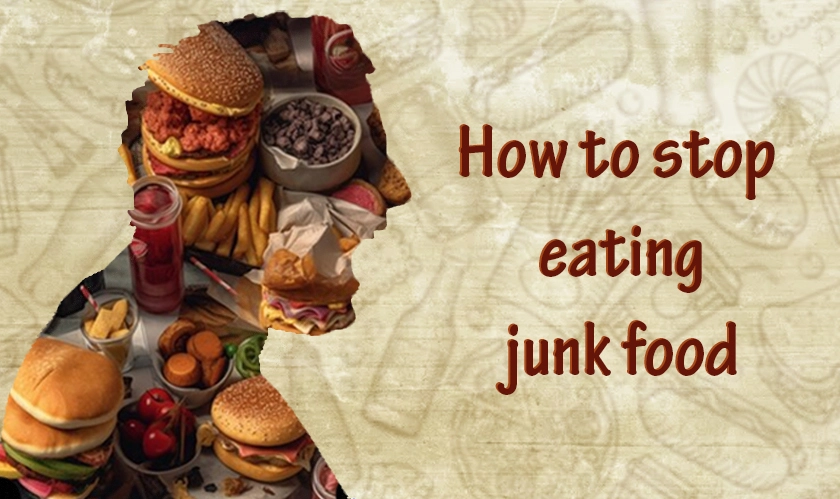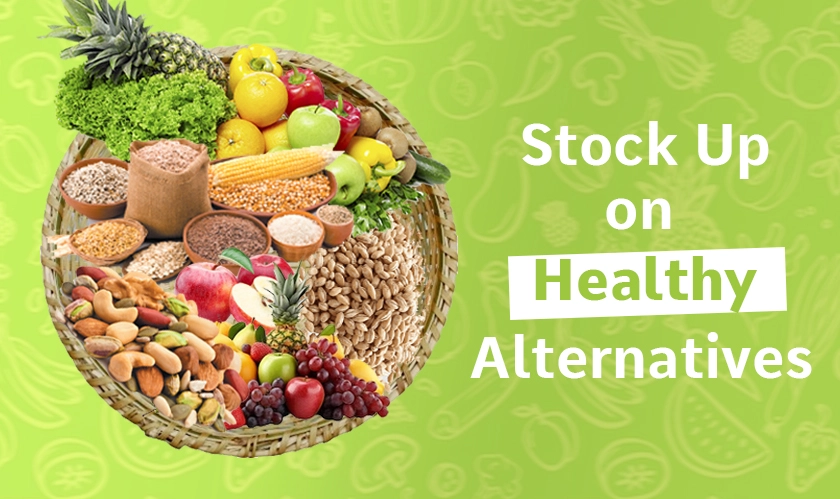Home Industry Food and beverage How to stop eating junk food...
Food And Beverage

CIO Bulletin
15 Febuary, 2024
"Junk foods" are foods that are high in calories, fats, salts, sweets, or low in vitamins, minerals, and other nutrients. The term "junk food" refers to food that isn't necessary for a healthy diet, especially in excess. When you eat junk food on a regular basis, you're giving your body more sugar, fat, salt, and chemical food additives. A constant intake of such food can often be referred to as a junk food addiction. Any weight reduction strategy can be swiftly derailed by cravings for junk food, but eating these items has other negative effects besides weight gain.
Long-term health effects may result from developing a habit of consuming potato chips, processed baked goods, sodas, and other sugary drinks. Consuming an unhealthy diet heavy in fried, sugary, and fatty foods increases your risk of developing type 2 diabetes, heart disease, stroke, depression, digestive problems, obesity, and even early mortality. It can be challenging to stop the cycle of bad eating habits, which increases your risk of related health issues the more often you give in to your cravings for junk food.
Consuming junk food for extended periods can have long-term health effects, including increased bad cholesterol levels, which may indicate heart disease.
Regular junk food consumption also raises the chance of developing conditions like stroke and hypertension and obesity. High blood pressure, or hypertension, is another name for the condition that occurs when there is a reduction in blood flow to the brain, depriving it of the oxygen and nutrition it needs to thrive. Overconsumption of junk food can cause constipation, tooth disease, and poor gut health due to its high acid and sugar content, as well as its low fiber content.
Consuming junk food can trigger the brain's "happy hormone," dopamine, which is linked to pleasurable behaviors like eating and shopping. This can lead to craving more junk food to relive past bliss. The mental dependence on food to feel good will result in physical problems.
Hormones, hypoglycemia, emotional variables, boredom, stress, and blood sugar imbalances are common food triggers. Recognizing the root cause of your desires is the first step towards conquering them.
Chronic stress, often in a fast-paced environment, triggers the body's stress hormone cortisol, leading to cravings for fried, sugary, and salty foods. Unmanaged stress increases the likelihood of turning to food as emotional comfort, causing emotions like anger, fear, and anxiety to be temporarily muted. A food and mood journal helps identify patterns of emotional eating, triggers, and overindulgence. It records eating habits, feelings, and emotions, helping identify better ways to manage emotions.
Environmental cues can influence one's dietary choices. There is mounting evidence that one's consumption level is influenced by environmental cues. People's eating habits can be influenced by their surroundings; for example, a sign advocating a trim physique may cause people to consume fewer test snacks. To prevent the occurrence of some unhealthy eating habits, it is critical to identify these environmental cues.

Consuming an abundance of fruits and vegetables can lower blood pressure, lower the risk of heart disease and stroke, prevent certain cancers, lower the risk of digestive and eye issues, and improve blood sugar regulation, which can help control appetite.
Eating a range of nuts is a great healthy snacking option; it will raise your levels of different nutrients because different types of nuts have somewhat different vitamin and mineral contents. A lower risk of heart disease has been associated with eating a diet high in nuts and seeds. Nuts and seeds are high in fats, but they are also low in (unhealthy) saturated fats and a good source of unsaturated and polyunsaturated fats.
Simply put, whole grains are composed of all three components. A nutrition education helps with knowledge such as knowing whole grains have high levels of dietary fiber, B vitamins, iron, magnesium, manganese, phosphorus, and selenium. It's interesting to note that consuming whole grains rather than refined grains has been associated with a lower risk of cancer, heart disease, and type 2 diabetes.
.webp)
Making your meals and snacks in advance is the best method to combat cravings. Through meal prep, you are significantly less likely to grab a leftover slice of pizza, order French fries, or eat the cookies someone brought into the workplace if you have a nutritious lunch and snacks packed and ready for you in the afternoon.
Next, make large quantities of simple dishes like cold salads, stir-fried or roasted vegetables, brown grains, and beans. To pack up serving quantities that you can grab in the morning on your way out the door, use foil, mason jars, or food storage containers. Fruits that are convenient for on-the-go afternoon snacks include oranges, bananas, and apples.
Slowing down is crucial for the body and mind to express nutritional needs; it is also a form of self-control techniques. It takes 20 minutes for the body to communicate satiation, leading to overeating. Simple ways to slow down include sitting down, chewing each bite, and using archaic etiquette.
Mindfulness exercises can help you learn more by tuning into our bodies. Through mindful living you can listen to emotional signals like stress, sadness, irritation, loneliness, or boredom, and pay attention to the bodies' hunger cues, rather than relying on the mind.
Water balances your blood sugar and makes you feel fuller. Stay hydrated throughout the day to prevent you from reaching for processed foods. Hydration benefits are unlimited; drinking water to stay hydrated can also reduce the likelihood that you'll grab a soda can or other unhealthy sugar-filled beverage.
There are several advantages to substituting water for carbonated drinks, sugary fizzy drinks, and alcohol in terms of mental, emotional, and physical health. Your skin, hair, and digestive system will all improve if you swap out all of these unhealthy drinks for water. Additionally, it aids in weight loss, increases metabolism, and improves blood circulation.
Conclusion
A substantial amount of the typical American's diet consists of junk food. Limiting junk food intake is recommended since eating items like soda, candy, and sugary baked goods too frequently can have negative health effects.
There are techniques to help you reduce your junk food intake if it's a big part of your diet. Some of them include making more meals at home, eating more protein, selecting more satisfying foods, and practicing stress management where social support plays a large role.
Although it's usually not required to abstain from junk food entirely, eating a diet that emphasizes items linked to favorable health outcomes, such satiating protein sources and produce high in fiber can assist you in making better decisions, like consuming less junk food or using it as a positive reinforcement.
FAQ
1. How does identifying triggers and temptations help in reducing junk food intake?
Identifying the root cause of junk food intake can help by avoiding circumstances when the temptation occurs.
2. What are some examples of healthy alternatives to replace junk food snacks?
Healthy alternatives to replace junk food snacks include, fruits and nuts, baked veggie fries, kale chips, homemade smoothies, etc.
3. How can mindful eating contribute to breaking the habit of consuming junk food?
By paying attention to what you eat, you can improve digestion, feel fuller after eating less, and make better decisions about what to eat in the future.
4. What role does hydration play in controlling cravings for unhealthy snacks?
Drinking water has proven to make you feel full; therefore hydration automatically lessens the intake of food.
5. Why is seeking support and accountability important in overcoming the addiction to junk food?
When it comes to any addiction, accountability is the first step to recovery, acknowledging that it is a problem. Having a support system is an added benefit in knowing you are not alone.







